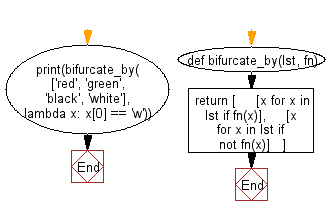Python: Split values into two groups, based on the result of the given filtering function
Split Values by Filtering Function
Write a Python program to split values into two groups, based on the result of the given filtering function.
- Use a list comprehension to add elements to groups, based on the value returned by fn for each element.
- If fn returns a truthy value for any element, add it to the first group, otherwise add it to the second group
Sample Solution:
Python Code:
# Define a function called 'bifurcate_by' that splits a list into two sublists based on a provided function.
def bifurcate_by(lst, fn):
# Create two sublists: one with elements that satisfy the condition (fn(x) is True),
# and the other with elements that do not satisfy the condition (fn(x) is False).
return [
[x for x in lst if fn(x)],
[x for x in lst if not fn(x)]
]
# Example usage: Split a list into two sublists based on whether the elements start with 'w'.
print(bifurcate_by(['red', 'green', 'black', 'white'], lambda x: x[0] == 'w'))
Sample Output:
[['white'], ['red', 'green', 'black']]
Flowchart:

For more Practice: Solve these Related Problems:
- Write a Python program to split a list into two groups: one with values greater than a given threshold and one with values less than or equal to it.
- Write a Python program to partition a list of strings into two groups based on whether they contain a specific substring.
- Write a Python program to split a list into even and odd numbers using a filtering function.
- Write a Python program to divide a list into two lists based on a lambda function that checks for divisibility by a given number.
Go to:
Previous: Write a Python program to group the elements of a list based on the given function and returns the count of elements in each group.
Next: Write a Python program to sort one list based on another list containing the desired indexes.
Python Code Editor:
What is the difficulty level of this exercise?
Test your Programming skills with w3resource's quiz.
